|
|
|
Sort Order |
|
|
|
Items / Page
|
|
|
|
|
|
|
| Srl | Item |
| 1 |
ID:
080760
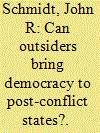

|
|
|
|
|
| Publication |
2008.
|
| Summary/Abstract |
Most interventions by outside forces to promote democracy in post-conflict states since WWII have failed. The most successful were in societies, such as Germany and Japan, featuring relatively high per capita GNP and diversified middle class economies. Among societies in general, prospects for democracy tend to diminish as per capita GNP decreases. The effects of conflict make democracy promotion considerably more difficult, particularly when poorer societies are plagued by weak institutions, corruption, religious extremism and ethnic, religious or factional animosities. Even if outsiders are able to control violence and actively promote democracy, success will depend on the underlying political culture and willingness of key political actors to play by democratic rules once the outsiders have gone. Hence, outsiders need to develop the best possible understanding of their prospects for success before committing to intervention, particularly when the resource demands are likely to be high.
|
|
|
|
|
|
|
|
|
|
|
|
|
|
|
|
| 2 |
ID:
080761
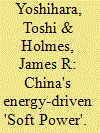

|
|
|
|
|
| Publication |
2008.
|
| Summary/Abstract |
Energy security has prompted China to turn its strategic gaze to the seas for the first time in six centuries. For now, Taiwan remains Beijing's uppermost priority, but there are signs that Chinese leaders are already contemplating the "day after" matters in the Taiwan Strait to resolve them to their satisfaction. In the meantime, China is attempting to shape the diplomatic environment in vital regions such as Southeast and South Asia using "soft power." By invoking the voyages of Zheng He, the Ming Dynasty's "eunuch admiral," Beijing sends the message that it is a trustworthy guarantor of Asian maritime security. But the success of this soft-power strategy remains in doubt.
|
|
|
|
|
|
|
|
|
|
|
|
|
|
|
|
| 3 |
ID:
080762


|
|
|
|
|
| Publication |
2008.
|
| Summary/Abstract |
As trade-driven growth and prosperity redefine both the Chinese economy and the global competitive landscape, U.S. policy makers increasingly must ponder whether the Chinese leadership will seek new options and capabilities to protect its far-reaching oceanic lifelines. As imported oil and raw minerals power the Chinese juggernaut, much of these flows traverse the Strait of Malacca and other littorals where there is little current Chinese capability to project power. In recent years, there is an ongoing debate among Chinese military circles regarding the feasibility of constructing a blue-water fleet that could change the balance of power in the Western Pacific and Indian Oceans. U.S. policy makers watch with increasing unease as a new generation of technically-savvy navy officers forcefully argue for a forward-looking maritime strategic posture that extends beyond the East and South China Seas. In addition, recent Chinese space-based and cyber warfare technology initatives bear watching as Beijing seeks to nullify key U.S. advantages in C4SRI using a high-tech variant of "asymmetric warfare." Although it is unclear what direction future Chinese maritime strategy and doctrine will take, U.S. policy makers need to remain vigilant about rising Chinese maritime ambitions and capabilities in the future
|
|
|
|
|
|
|
|
|
|
|
|
|
|
|
|
| 4 |
ID:
080759


|
|
|
|
|
| Publication |
2008.
|
| Summary/Abstract |
In an era when democratization is stalled or in retreat in many parts of the world, it is important to highlight the successful democratic experience of East and Southeast Asia in recent decades. Five consolidated democracies have emerged since the mid-1980s; only Thailand has seen some backsliding with the 2006 coup. The Asian cases provide insights into several major debates in the democratization literature, including the relative importance of culture, history, economic structure, and the optimal sequencing of political and economic reform. This article reviews these issues, with particular attention to the role of outside powers in underpinning democratization. Ultimately, the Asian cases offer evidence for optimism about the prospects of a Fourth Wave of democratization.
|
|
|
|
|
|
|
|
|
|
|
|
|
|
|
|
| 5 |
ID:
080755
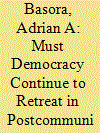

|
|
|
|
|
| Publication |
2008.
|
| Summary/Abstract |
In late 2004, Ukraine's Orange Revolution appeared to herald a second wave of democratic transformation destined to sweep through much of postcommunist Europe and Eurasia. Now, only three years later, this wave has dissipated. Some analysts see democracy as being in retreat and they view the lessons of 1989-2004 as no longer applicable. This article posits that democratic progress is, in fact, still achievable in many former communist countries, and that a look at recent history provides important perspectives towards that goal. However, both the region's reform leaders and Western policy makers must also take full account of the new "post-postcommunist" paradigm. This paradigm is characterized by Russia's negative and increasing influence, the European Union's "expansion fatigue," the waning of U.S. democracy-promotion efforts and credibility, and some degree of democratic disillusionment. With re-invigorated and more united efforts, the impressive post-1989 gains in democratization can be consolidated and new momentum built towards the goal of "a Europe whole and free."
|
|
|
|
|
|
|
|
|
|
|
|
|
|
|
|
| 6 |
ID:
080756
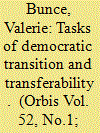

|
|
|
|
|
| Publication |
2008.
|
| Summary/Abstract |
There is no single road to democracy. However, there are some factors that seem to have consistently positive effects on democratic development. These include the existence of a large and diverse civil society; a sharp political break with the authoritarian past, followed by regular turnovers in political leadership and governing parties; stable state borders; and political institutions which empower parliaments and, in culturally diverse societies, give minorities political voice without locking them into permanent coalitions that block collaboration across group divides in pursuit of common goals. Less important are economic considerations-though economic reforms are far more likely in democratic settings than in authoritarian regimes and far more supportive over the medium- and long-term of robust economic performance
|
|
|
|
|
|
|
|
|
|
|
|
|
|
|
|
| 7 |
ID:
080758
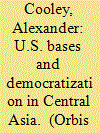

|
|
|
|
|
| Publication |
2008.
|
| Summary/Abstract |
Under the Pentagon's current Global Defense Posture Review (GDPR), the United States is reducing its forces in several major Cold War base hosts and establishing a global network of smaller, more flexible facilities in new areas such as Central Asia, the Black Sea and Africa. Drawing upon recent evidence from the Central Asian base hosts of Kyrgyzstan and Uzbekistan, this article cautions that these new U.S. overseas bases, despite their lighter footprint and regardless of the prevailing security situation, risk becoming enmeshed in the local struggles and political agendas of elites within these hosts. Periods of turbulent democratic transition and regime instability may encourage host country politicians to challenge the legitimacy and terms of the U.S. basing presence for their own political purposes. These are important lessons for U.S. planners who are simultaneously promoting democratization while they negotiate basing and military access agreements in these same politically volatile hosts
|
|
|
|
|
|
|
|
|
|
|
|
|
|
|
|
| 8 |
ID:
080757


|
|
|
|
|
| Publication |
2008.
|
| Summary/Abstract |
Three years have passed since the Orange masses swelled in the streets of Kyiv and yet, despite the Orange Revolution's promises of democratization, state weakness and governmental fragmentation continue to deter democratic progress in Ukraine. This article examines the situation in Ukraine today and argues that political, economic and social developments in the country have largely confirmed the Project on Democratic Transitions' hypotheses regarding the factors that facilitate or hinder post-communist democratic transitions. The PDT hypothesis concerning anti-democratic diffusion from Russia is particularly relevant to the Ukrainian case - as is the proposition that ineffective management of ethnic conflicts undermines democratic development. Drawing upon these and other relevant hypotheses, the essay presents pragmatic solutions for dealing with obstacles to democratic progress in Ukraine and underscores the important role Ukraine can play in influencing democratic development in its fellow post-Soviet states.
|
|
|
|
|
|
|
|
|
|
|
|
|
|
|
|
|
|
|
|
|